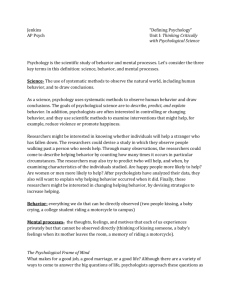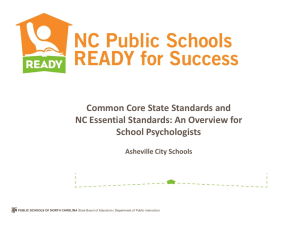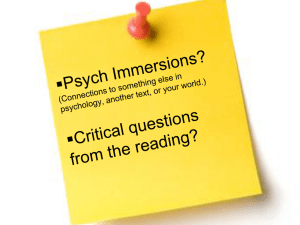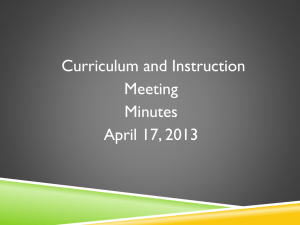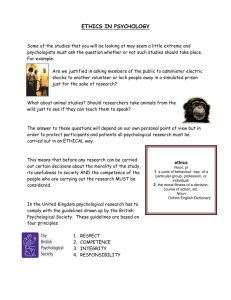very small - Cobb Learning
advertisement
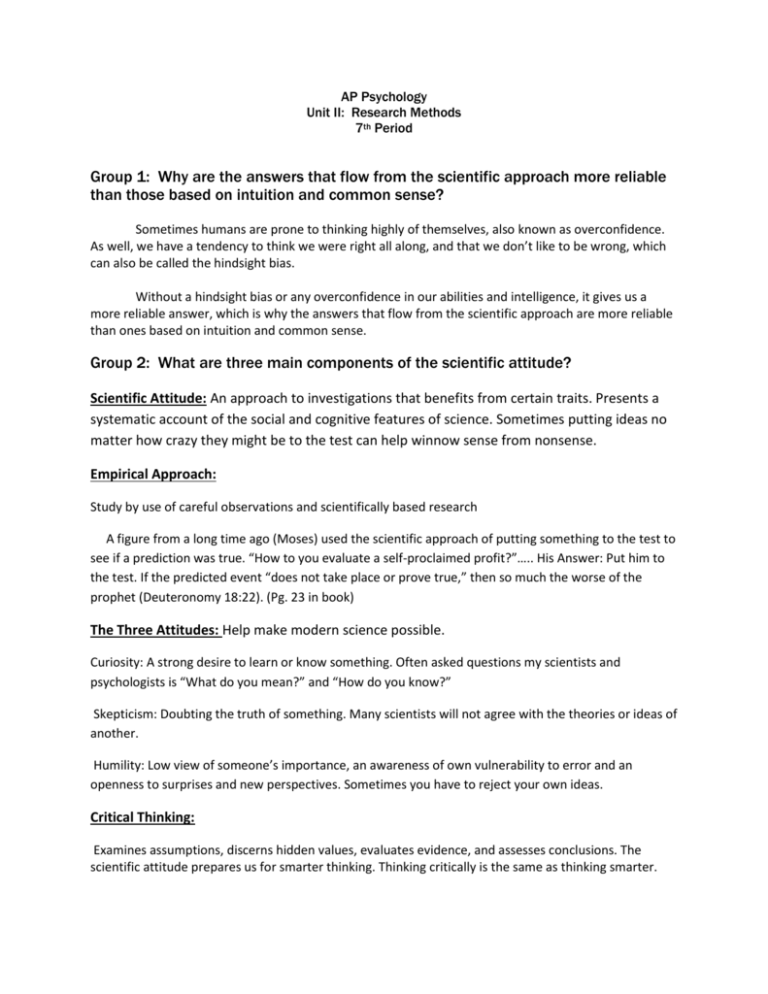
AP Psychology Unit II: Research Methods 7th Period Group 1: Why are the answers that flow from the scientific approach more reliable than those based on intuition and common sense? Sometimes humans are prone to thinking highly of themselves, also known as overconfidence. As well, we have a tendency to think we were right all along, and that we don’t like to be wrong, which can also be called the hindsight bias. Without a hindsight bias or any overconfidence in our abilities and intelligence, it gives us a more reliable answer, which is why the answers that flow from the scientific approach are more reliable than ones based on intuition and common sense. Group 2: What are three main components of the scientific attitude? Scientific Attitude: An approach to investigations that benefits from certain traits. Presents a systematic account of the social and cognitive features of science. Sometimes putting ideas no matter how crazy they might be to the test can help winnow sense from nonsense. Empirical Approach: Study by use of careful observations and scientifically based research A figure from a long time ago (Moses) used the scientific approach of putting something to the test to see if a prediction was true. “How to you evaluate a self-proclaimed profit?”….. His Answer: Put him to the test. If the predicted event “does not take place or prove true,” then so much the worse of the prophet (Deuteronomy 18:22). (Pg. 23 in book) The Three Attitudes: Help make modern science possible. Curiosity: A strong desire to learn or know something. Often asked questions my scientists and psychologists is “What do you mean?” and “How do you know?” Skepticism: Doubting the truth of something. Many scientists will not agree with the theories or ideas of another. Humility: Low view of someone’s importance, an awareness of own vulnerability to error and an openness to surprises and new perspectives. Sometimes you have to reject your own ideas. Critical Thinking: Examines assumptions, discerns hidden values, evaluates evidence, and assesses conclusions. The scientific attitude prepares us for smarter thinking. Thinking critically is the same as thinking smarter. Group 3: How do theories advance psychological science? -First, a theory is an explanation using an integrated set of principles that organizes observations and predicts behaviors or events. -Theories simplify things by organizing single facts -Theories connect facts together to make them deeper facts -When we connect all the parts we discover the big picture, that these theories help us create -A theory will create a testable prediction -Theories organize things So, theories advance psychological science by organizing facts and connecting them to discover the bigger picture, create a prediction that will be tested and imply hypotheses Group 4: How do psychologists observe and describe behavior? How do Psychologists Observe and Describe Behavior? Psychologists observe and describe behavior in many ways. Some of the ways psychologists observe and describe behavior include case studies, surveys, naturalistic observations, laboratory observations and psychological tests. They also conduct things such as tests and experiments. Case studies- an in depth study where data is collected through interviews, observations, and testing. All data is recorded. Surveys- a voluntary recording of data or a “self –reported data.” This method is very misleading/biased. Naturalistic Observation- an observation held without changing anything about what the subjects do. Laboratory Observation- a somewhat controlled research setting inside a laboratory. Psychological tests- collects data about things that are more mental aspects than anything else. Experiments are more likely to show a cause-and-effect result. Within an experiment there are two different groups. The two groups are control group and the experimental group. These experiments can be set in different ways such as a double blind, blind, or controlled experiment. Control group- the group that is not given the treatment or and is given a placebo in order to monitor what the treatment changes. Experimental group- the group that receives the treatment in order to see what the effects are. Double blind experiment- an experiment where neither the research nor the participants know who is receiving the real treatment in order to keep a placebo effect from happening. Blind- an experiment where only the participants do not know if they have the placebo or not Controlled experiment- an experiment where both the participants and the researchers know who is receiving what. Along with the different types of researches there are also many things that can lead to compromised result. Things such as bias, extraneous variables, reliability, and validity can lead to false, wrong, or compromised data. Reliability- found by retesting a group more than once to see if the outcome remains the same. The more amounts of times the same result happens the more reliable the test is. Validity- Content validity- the ability of the test to fully evaluate the important characteristics that are being measured. -Criterion validity- a test that can predict an outcome from a trait. Bias- there are many types of bias but they all center around the fact that there is something compromising the data. Extraneous variables- the bias in the fact that no person from the control group is exactly the same as a person from the treatment group because cloning is illegal. Cite: http://www.sparknotes.com/psychology/psych101/researchmethods/section3.rhtml Psychologists have many different ways to observe behavior. First, they may choose to use a controlled experiment. In this the observer will directly manipulates the presence or strength of a factor or variable and measures how behavior is affected by it. Next, there is a The Observational Method in this they experimenter simply observes and dose not take any part in the method. The Correlational Method, is also used, in this the experimenter will interview and observe the answers given. Finally, probably the most famous way to collect data is though surveys and test. In this the observer will conduct a survey and study the data collected. When conducting an experiment to observe behavior, the psychologist can use any method they choose. The ones stated previously are some of the most popular methods. Once all the data is collected the psychologist will now have to describe the behavior presented. A human has many things that can affect behavior. Some of them being your mood, people around you, and the things that have happened to you. Therefore, to describe this psychologist can use many different methods. Some may be simply restating what happened. They may also write a paper to describe what has happened. Researchers can also use graphs/ charts/ pictures to explain their findings. Sourceshttp://www.essortment.com/psychologists-study-behavior https://www.udemy.com/blog/goals-of-psychology/ Group 5: Can laboratory experiments illuminate everyday life? It is said to be that lab experiments can affect people’s everyday lives in the real world and in controlled environments. If an experiment is based on aggressive behavior, it doesn’t mean that you will show the same exact behavior you did in the experiment to the things you do on a normal day to day basis, but many of the reactions will be similar. In Cecilia Cheng’s experiment, he found that adults who coped with laboratory stress also coped from marriage stress where the principles were the same. From these principles, we are able to understand, describe, explain, and predict behaviors we have every day. Group 6: Why do psychologists study animals, and is it ethical to experiment on animals? Many psychological aspects of animals are similar to those of humans (we ARE animals ourselves) Studying animals simplifies our research by allowing us to avoid various types of bias more easily Only a very small percentage of animals in the world are used for this research, and it is only a fraction of the number of animals we consume, or kill in animal shelters The research saves more animals’ lives (not just humans’) than it takes—they benefit too! As we learn more about the animals, people gain more empathy for them, and treat them better in their natural habitats as well Ethical values on the matter vary by culture Research using animals can be deemed ethical if: 1. It has a clear purpose 2. Animals receive humane treatment 3. Animals are acquired legally 4. Animals experience the least amount of suffering possible Group 7: Is it ethical to experiment on people? There are seven principles for ethical research to protect the people participating in any kind of research. The 7 principles are: - Social Value - Scientific Validity - Fair Subject Selection - Favorable Risk-Benefit Ratio - Independent Review - Informed Consent - Respect for Enrolled Subject Social Value: social value means that the study should help researchers determine how to improve people’s health or well-being. Research can do this directly, by finding results that lead to better tests and treatments for disease. In addition, research can do this indirectly by generating information that increases understanding, in addition to guiding future information. Doing experiments is essential for learning the scientific method. Social value is great for teaching and training the upcoming generation of researchers. Scientific Validity: in other words, “scientifically valid.” The research should be expected to produce useful results and increase knowledge, which is important because there is a limited amount of money and supplies for research. Any research method should be carefully planned to answer a/the certain question. For an experiment to be scientifically valid, there should be a hypothesis to be tested on, a control, and controlled variables too. When an experiment is reproducible, it means that if other researchers did the same experiment, they should get the same results. Bias is when a researcher, hoping to get a specific result, will design their research in a way that makes that result more likely to happen than normal. Fair Subject Selection: is when researchers should be fair in both recruiting and deciding which people can be in the study. The goal of this practice is to be fair to both people who might be subjects and to people who might benefit from the treatment or method being studied. Favorable Risk-Benefit Ratio: is a balance by the benefits to subjects and/or the important new knowledge that society will gain. The riskier the research study is, the more benefits it must offer to be considered ethical. Even a research study that does not give subjects health benefits can be ethical, as long as the study is designed to potentially benefit society. For this kind of study, the risks should be low. The social value of the research are the benefits that society gets from the study. Researchers should always be careful to minimize risk and protect subjects, even when conducting surveys. Researchers have a lot to consider when they design their own research studies. So, to avoid such problems, a group of people who are not connected to the research are required to give it an Independent Review. The group responsible for this activity is often called an Institutional Review Board. Independent Review will help make sure research studies fulfill all of the ethical principles, and it is also important for building society’s trust in research. Informed Consent: is when people involved in a research study agree to participate, after they are told the details of the study. There are four components of informed consent: - The subject must be competent. This means he or she must be capable of understanding the facts about the research and making a decision based on them. - The researcher must give a full disclosure. This means the researcher must tell subjects what they need to know about the study, including the goals and benefits. - The subjects must understand what the researcher tells them. - The subjects decision to participate or not should be voluntary, rather than the result of pressures. Respect for Subjects: In order to show respect for human subjects, researchers must – - Continue to check the well-being of each subject as the study proceeds. - Keep any information about the subject confidential. - Allow any subjects to quit the study at any time they want. - Tell subjects about any new information they need to know, including new risks that the researchers learn after the study starts. - Share the results of the study with the subjects, showing that they are partners in the research. Group 8: Is psychology free of value judgments? We believe that psychology is not free of value judgment for many reasons. Psychologists have pressures and influences in their life while having to come up with factual evidence that is unbiased. If a Muslim psychologist has to study the characteristics of a Christian church congregation, his results could be concluded to be biased. A psychologist’s values could influence him to pick a certain side in his studies. Therefore, all psychologists’ results are not free from value judgments. In a double blind experiment psychologists are forced to have their judgment free of the conducted experiment because psychologists and the subjects do not know which group is receiving treatment or which one is receiving the placebo. This type of experiment was created solely to keep psychologists' opinions out of their factual evidence. If neither side is aware of the treatment, then there cannot possibly be a biased side.
